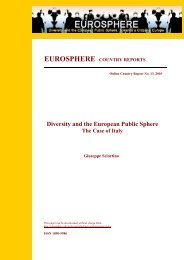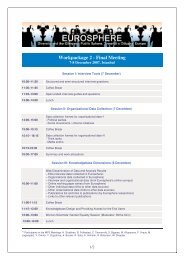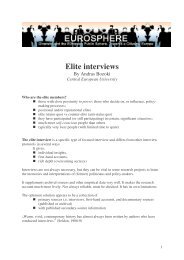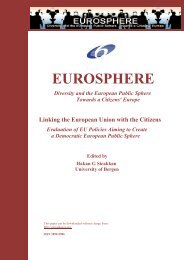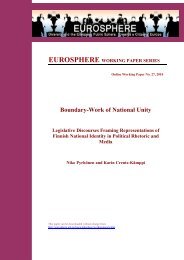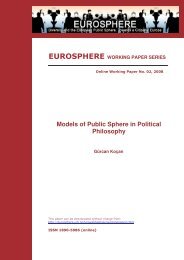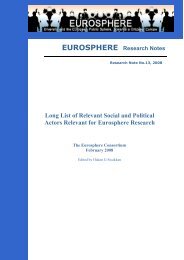Migrants, Minorities, Belongings and Citizenship. Glocalization and ...
Migrants, Minorities, Belongings and Citizenship. Glocalization and ...
Migrants, Minorities, Belongings and Citizenship. Glocalization and ...
Create successful ePaper yourself
Turn your PDF publications into a flip-book with our unique Google optimized e-Paper software.
Residence, Permanent Residence, Matrimony <strong>and</strong> Family Union/Reunion, <strong>Citizenship</strong><br />
Acquisition<br />
The rights that Glocalmig focuses on differ significantly in the member <strong>and</strong> associated<br />
countries; <strong>and</strong> the comparative picture that this component provides is crucial. The<br />
results from this component are a part of QC-CITBASE.<br />
Dimension 3: Institutions <strong>and</strong> policies of citizenship<br />
This component organizes, analyzes, <strong>and</strong> presents the data about institutions <strong>and</strong> policies<br />
of citizenship in six countries. The focus is on the impacts of the institutional <strong>and</strong> policy<br />
frames of member states as well as of the European Union on citizens’ <strong>and</strong> residents’<br />
rights exercise, involvement in politics, coexistence <strong>and</strong> mobility.<br />
The institutional frames are analyzed in two main categories: the numeric channel <strong>and</strong><br />
the corporate-plural channel. These two channels constitute the national space of<br />
belonging <strong>and</strong> political action. The institutions framing the rights of citizens <strong>and</strong> residents<br />
concerning their participation in the numeric channel are election systems, welfare<br />
systems, party systems, <strong>and</strong> representation systems. This project component assesses to<br />
what extent the four categories under our investigation have been involved <strong>and</strong> active in<br />
the corporate-plural bodies <strong>and</strong> to what extent this involvement affect their participation<br />
in the numeric (elections <strong>and</strong> party politics) <strong>and</strong> alternative (essentialized, glocal <strong>and</strong><br />
transnational spaces) channels. The questions to be answered in this project component<br />
are:<br />
1) What local, sub-national, national, <strong>and</strong> supranational institutional arrangements<br />
<strong>and</strong> policies exist for guaranteeing the rights of majority citizens, second <strong>and</strong><br />
third country nationals, historical minorities, <strong>and</strong> extra-territorial <strong>and</strong> extra-<br />
European citizens (party systems, election systems, representation systems,<br />
interest organizations, immigrant <strong>and</strong> historical minority organizations,<br />
corporate representation <strong>and</strong> voice structures <strong>and</strong> institutions involved here,<br />
NGOs, transnational organizations, <strong>and</strong> state institutions involved in securing<br />
<strong>and</strong> serving these rights in practice; the names, calls <strong>and</strong> functions of these<br />
institutions; information about their interaction with other sub-national,<br />
national, transnational <strong>and</strong> supranational institutions <strong>and</strong> policies –e.g. the EU’s<br />
INTERREG programmes).<br />
2) How these institutions <strong>and</strong> policies provide effective/ineffective participation,<br />
influence, <strong>and</strong> voice to our four categories<br />
45



